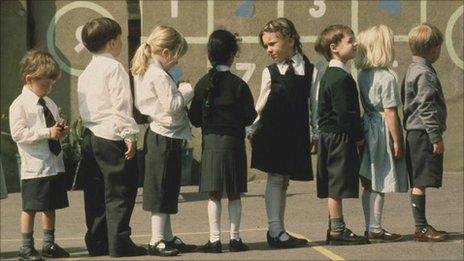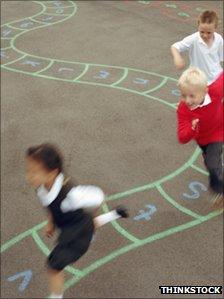Summer-born struggle: Why August children suffer at school
- Published

With evidence continuing to mount that children born at the beginning of the school year do much better than their younger peers, what can teachers and parents do?
Most people know the rhyme about Monday's child being fair of face and Tuesday's child being full of grace.
If somebody was to revamp the rhyme for months, it might read: "September's child will be a success while August's child will have all the stress."
There is a substantial and growing body of evidence to back up the claim that children born in certain months do better at school because they are the oldest in the year.
The best months to be born to ensure your child is physically and emotionally head and shoulders above the rest of the class depends on where you live in the UK.
A child's age on 1 September determines the point of entry in England and Wales, whereas it is 1 July in Northern Ireland. In Scotland, all those born between March of a given year and February of the following year are placed in the same group.
The latest research from the Institute for Fiscal Studies (IFS) , externalfocuses on England and looks at the test scores and happiness levels of August-born children compared with their older, September-born peers.
It found children born in August scored substantially lower in national achievement tests and other measures of cognitive skills.
At the age of seven, they are more than three times as likely to be regarded as "below average" by their teachers in reading, writing and maths.
The subject has been researched for decades and studied in various countries with a cut-off date for admissions, says research economist Ellen Greaves, who co-authored the report.
She says there is a general consensus that the oldest in the year do better than their younger peers, and while the gap shrinks over time, it can persist through to GCSEs and have a long-lasting effect on employment opportunities.
The IFS research showed August-born children were 20% more likely to study for vocational qualifications if they stayed on in education, and 20% less likely to be at a leading university compared with a September-born teenager.
This study also considered how month of birth mattered for a child's well-being.
"It is clear that the consequences of the month in which you were born extend beyond educational attainment. We find evidence that, particularly at younger ages, summer-born children are more likely to report being unhappy at school and to have experienced bullying than autumn-born children," says Greaves.
The impact of date of birth on test scores is well documented. The August birth penalty is visible in scores at every age for children in English state schools, according to a 2007 IFS report., external
Kelly Bedard and Elizabeth Dhuey (2006), external provide substantial evidence that these initial maturity differences have long-lasting effects on student performance across a number of OECD countries. And a 2010 study by the Higher Education Policy Institute, external found 28% of August-born children went to university compared with 32% of those born in September over a six-year period.
Everyone remembers the pupils in school who were the biggest or the brightest, and many people will say that it is simply common sense that the oldest children in the year will be more mature and advanced. But it can also be a matter of confidence.
Most children who are young for their year will be behind their older peers in terms of speech and language, motor abilities and social skills, says Dr Kairen Cullen, from the British Psychological Society.
"It is a steep learning curve at this time of life. A year is a substantial percentage of a child's life at the age of five."
Dr Cullen, a former teacher and an August-born child, says while it is not best viewed as a life-long affliction, being the youngest in the year can affect a child's confidence and self-esteem.
"Those early formative years influence attitudes and expectations about success, academically and socially, and that can possibly stay with an individual."
Vivian Hill, an educational psychologist at the Institute of Education, says a "disproportionate number of children born in the summer months" are brought to her for help.
She says the way schools are organised means the younger children appear to be struggling when in fact they are where they should be for their age.
"While some do have needs that need to be addressed, for a lot of them it's simply that they look like they are doing worse than the rest of the class. Developmentally they are eight, nine, 10 months younger and at that age, that's a big difference."
She says summer-born children can be typecast as low achievers by their teachers and they can start to view themselves as such.
"It can become a self-fulfilling prophecy," she adds.
Education expert and former teacher Chris Waterman says it is a fact of life that the youngest in any group will be the most vulnerable.
"If you are the runt of the litter, then you will be picked on and bullied a bit. You are not form captain and you don't get in the first year football team."
There will of course be many high-achieving summer-born people who buck the trend, and Sir Chris Woodhead says it is "dangerous" to assume that it applies to every child.
The former chief inspector of schools in England expressed his doubts over the study's findings that the youngest pupils were more unhappy in the early years of school.
"Our current pre-occupation with happiness and well-being is stupid and is likely to lead to further under-achievement because real learning involves challenge, difficulty and unhappiness."
Unhappiness is part and parcel of the learning experience, he says.
"I don't want kids to be desperately miserable but we don't want them to be complacent and self-satisfied all the time. If kids are always completely confident and comfortable, they aren't going to make much progress."

Early confidence can translate into long-term advantage
The month of birth issue is clearly important for educationalists and parents, but it does not seem to attract much wider attention. The focus often tends to be on other factors such as the impact of poverty, place of birth or parental background on educational attainment.
So what can be done to ameliorate this month bias?
Early years specialist Dr David Whitebread, from the University of Cambridge, says one possible solution would be to increase the age at which children start school.
Children in the UK start school much earlier than most of their European counterparts. Dr Whitebread says research has shown that the later children start formal education, the less marked the month effect is.
"In countries where they start a year older than the UK, the month effect is less marked and in countries where they start as late as seven, it completely washes out."
If children are kept playing in kindergarten until the age of six or seven, they are better equipped to cope with formal education, he adds.
Sir Chris says it does not require government intervention but is a matter for individual teachers to recognise the needs of individual children and plan their education accordingly.
Other solutions include differentiating the curriculum, accounting for age in exams, and greater flexibility to keep the youngest children back a year.
Waterman says other than everyone giving birth in September, the status quo is unlikely to change. He says the ultimate responsibility lies with the teachers.
"Teachers should be sympathetic to the fact that these kids are young and need time to grow up."